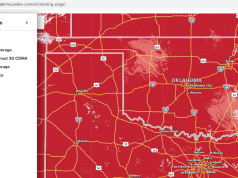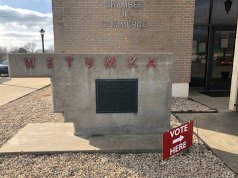

Energy company EDF Renewables intends to reverse its controversial Rock Falls Wind Farm bond agreement that had complicated school financial situations for northern Oklahoma districts, according to company representatives. The decision was made after an Oct. 24 meeting with school superintendents and will likely preserve revenues for those districts.
“The conversation with the superintendents had an impact with us, and the message they delivered was received from our CEO to those working in the field,” EDF Renewables Senior Director of Development Matthew McCluskey said around 11 a.m. today during a phone interview. “When we were in that meeting, it was poignant. We learned how complex Oklahoma school district finance really was. It impacts every school district differently, the investments we make.”
That complexity had left two school districts — Newkirk Public Schools and Deer Creek-Lamont Public Schools — in precarious financial situations for multiple reasons. After EDF Renewables sought property tax exemption through an agreement with the neighboring Blackwell Economic Development Authority, existing and future bond payments at the two districts were set to be affected. Additionally, the mid-year adjustment process within Oklahoma’s school funding formula left the districts facing reductions in state aid this January if EDF continued to pursue its appeal for a property tax exemption.
Now, the company will amend its legal filings in Grant and Kay counties to abandon the property tax exemption claim, though they will move forward with a challenge to the wind farm’s assessed value, Jennifer Berry of the Phillips Murrah Law Firm said Friday.
“From a preservation-of-rights standpoint, it will stay under the same [cases],” Berry said.
McCluskey said EDF “wanted to make sure that we were doing the right thing.”
“After that meeting, we came back with a lot more information,” he said. “We always want to make sure that the schools benefit from the investment we make. That is the intent. So we are proceeding to terminate our BEDA agreement, which means we plan to pay our property taxes prior to the IRB structure.”
Superintendent: ‘I was relieved when I first read it’
Before noon Friday, EDF sent an email to administrators with the four educational jurisdictions most affected by the Rock Falls Wind Farm situation: Newkirk, Deer-Creek Lamont, Blackwell Public Schools and Pioneer Technology Center.
“The primary purpose of this letter is to let you know that after thorough evaluation of this complex situation, we intend to reverse the bond transaction with the Blackwell Economic Development Authority (BEDA) that provided for an exemption from ad valorem taxes,” EDF asset manager for generation Chris DeVault wrote in the email. “We would like to schedule a meeting with you the week of November 12, 2018, or as soon thereafter as is practical, to discuss in greater detail our decision, as well as to strengthen our relationship with you.”
Newkirk Superintendent Brady Barnes said he was in a meeting with other superintendents of Kay County discussing the issue and NonDoc’s story from earlier Friday when he received the email.
“I was relieved when I first read it. But I’ve done this long enough to know I’m not going to count my chickens before they hatch,” said Barnes, whose district has more than $550,000 in question. “I want to see how this plays out in the next few weeks before I feel comfortable about the situation.”
Told that EDF would still be challenging the Rock Falls Wind Farm’s valuation, Barnes said he hopes that determination is made for next fiscal year.
“I believe they should pay their fair share of taxes, but that’s not my job to determine the assessed value,” Barnes said.
Berry said assessment challenges are fairly common.
“It’s common whether it’s a wind project or a homeowner or some other commercial business in terms of what they have documented that they have put into it and has been depreciated versus what the assessor has [determined],” she said. “The assessor is usually on the high end.”
Barnes said he hopes any change in assessed value will be “in the future.”
“I hope that’s not this year because that’s going to open up another can of worms,” Barnes said. “There is some concern now in my voice if they’re going to protest that because now there is some uncertainty.”
Brent Bushey, executive director of the Oklahoma Public School Resource Center, praised EDF’s decision and said he hopes to see the situation minimize impact on the schools.
“We’re encouraged to hear that EDF recognizes the financial challenges faced by the districts, and we are hopeful this gets resolved in a positive fashion,” Bushey said.
McCluskey said he believes it will.
“We care about the schools and the future of the children in the communities we work,” McCluskey said. “We value our relationships with the community, and education is a foundation upon strong communities.”
McCluskey also noted a hope from energy industry leaders that the state of Oklahoma pursues “stable” energy policies moving forward. The Rock Falls Wind Farm project began development in 2014, started construction in January 2017 and saw a statewide zero-emission tax credit be terminated for new projects on June 30, 2017. The wind farm was completed in December of that year and was left seeking other financial incentives to make up for what the state stopped.
“Stable energy and legislative policy promotes a healthy business climate and environment,” McCluskey said. “Different states do it in different ways, but I think more paramount to — is it at the state level, is it at the local level? — is the fact of whether there is stability.”




















